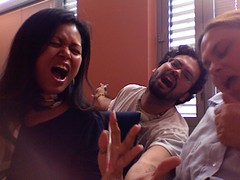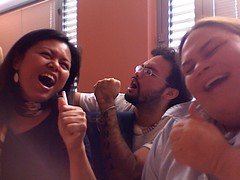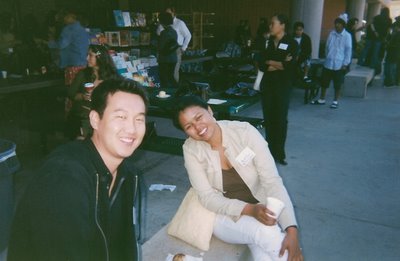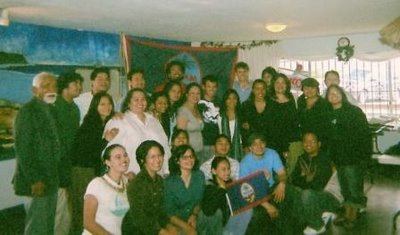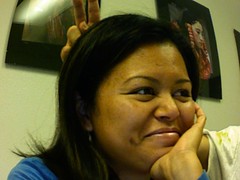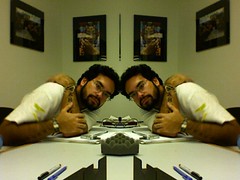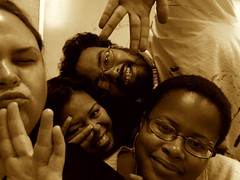Yesterday a question was posed to me about
"hayi indigenous siha?" for which I did have an answer, but not a real convincing answer. The question was who in India counts as the "indigenous people" there.
Three obvious points come to mind:
1. India has only existed for a few hundred years, and the term indigenous of India cannot be adequately conceived of at the national level, only at the local level in different regions. As far as I know, India has not produced a strong ethnic category to contain, fix or homogenize the figure of the native, like the United States has been able to do.
2. Postcolonialism which has derived much of its genesis and flavor from the Indian example, is not really associated with the question of indigenous people in India. It seems more focused on the gestures, the innovations and the exclusions of the nationalist and independence movements. Postcolonial studies as a whole bears an interesting resistance to indigenous issues because of the wariness to "nativist" sentiments. The language of revolutionary nationalism always has an indigenous edge to it, meaning that it posits itself as the source or the origin of an order. The problem with this of course is that this "original" declaration of a nation, is always an independence against the being and possibility of those who remain as the "indigenous people" of this newly asserted nation.
3. The term indigenous today refers to not just attachment to land, but also an ambiguous or antagonistic relation to the state, which is often visible as an abject or tragic position. Indigenous people are those who are too attached to their land and their way of life, so that they can never break with it to enjoy the comforts and advances of modern life. The definition of indigenous people in India lies at this connection, between people who are tied to a "previous" way of life and live in poverty because of it.
I am on a listserv for information about indigenous people resisting militarization and recently I received this email from India, which makes the issues of indigenous people in India, far from merely an academic exercise.
**********
EMPOWERING THE JUMMA INDIGENOUS PEOPLE WITHIN THE FRAMEWORK OF THE CHT ACCORD
Prajnalankar BhikkhuIntroduction:The term “empowerment” is used in various contexts. Generally it refers to increasing the political, social and economic strength of individuals. It involves the empowered developing confidence in their own capacities.
Sociological empowerment addresses social discrimination processes that exclude members of groups or a particular group in society from decision-making processes through -- for example -- discrimination based on race, ethnicity, religion and gender.
In economic development, the empowerment approach focuses on mobilizing the self-help efforts of the poor rather than providing them with social welfare services.
Political empowerment means giving lawful rights or authority to a body or a community so that it can freely make decisions on certain matters and execute those decisions for development and welfare of the people. Decision execution requires administrative staff and fund. Therefore, administrative staff and fund are also essential elements of empowerment.
The CHT Accord of 1997:The government of Bangladesh and the Parbatya Chattagram Jana Samhati Samiti [(PCJSS= People’s United Party, the political organization representing the 11 indigenous peoples/communities of the Chittagong Hill Tracts (CHT) collectively known as “Jumma” and resisting Bangladeshi integrationist and ethnic-cleansing policy locally known as “Islamization policy”)] reached an agreement popularly known as the “CHT Accord” in 1997. The CHT Accord officially put an end to the decades-old conflict between the indigenous peoples and the Bangladesh authorities and opened a new phase in the history of the very lesser known part of the world. It empowers the indigenous peoples with the decision-making authority on certain local affairs.
How CHT Accord empowers Jumma indigenous people:The CHT Accord introduces a unique local government system in the CHT within the framework of a Regional Council (RC) and three Hill District Councils (HDCs) -- both consisting of indigenous people and “non-indigenous permanent residents”. The system provides a federal state-like structure to the CHT region. The RC is the chief policy-and-decision-making body, the nucleolus of the local government in the region. It is formed with the members elected by the members of the HDCs
[1], while the HDCs are formed with the members directly elected by the people (indigenous people and “non-indigenous permanent residents”) of the CHT.
[2] The RC supervises and coordinates the functions of the HDCs, general administration, law and order and all developmental activities including that of the CHT Development Board (CHTDB) and NGOs.
The RC and HDCs work like the legislative body of the CHT local government. They are accountable to the people for their functions.
The CHT Accord empowers the HDCs to undertake, design, implement, monitor and evaluate all kinds of development projects on the 33 subjects such as land, local police, development etc.
The Deputy Commissioner (DC), Thana Nirbahi Officers (TNO) and all the subordinate officers under them including police are administrative components of the CHT local government. They are called civil servants, popularly bureaucrats. They are, by rules, accountable to the CHT local government (RC and HDCs) for their functions. They are permanent part of the local government. RC and HDCs members could be changed, but these bureaucrats are not -- they continue to work at their offices until their age-limit for service is over. However, on recommendation of the RC, Dhaka (the government) could transfer, suspend, and dismiss the DCs and TNOs from their posts, if (1) they differ with the RC and HDCs on certain policy and administrative matters; (2) they fail to discharge their duties properly; (3) they do not follow the directives of the CHT local government no matter which authority appoints them; (4) they are charged with criminal offences.
The CHT Accord says that all the officers/bureaucrats of the CHT administration will be appointed from amongst the “permanent residents” of the CHT giving “priority” to the indigenous candidates.
[3]As said above, fund is an essential part of empowerment. No body can work for development without fund. The CHT local government raises its fund from the government
[4] and other resources like tax and contribution.
[5] It formulates and approves its budget according to the manner laid down by rules for this purpose.
[6]The Ministry of CHT Affairs headed by a Minister from amongst the Jumma indigenous people looks after the overall development and welfare of the people of the CHT.
[7]In a given functional democracy, this is what the CHT Accord says about the CHT local government system, empowerment of the Jumma indigenous peoples and “non-indigenous permanent residents” and decentralization of power.
Challenges:The CHT local government system as stated above will be in effect if Dhaka respects democracy and rule of law and Acts concerning the CHT. But Dhaka does not.
Presently there is no proper system of governance in the CHT. The Ministry of CHT Affairs is under the Prime Minister of Bangladesh Ms. Begum Khaleda Zia. Dhaka has formed the HDCs with the ruling Bangladesh Nationalist Party (BNP) workers and Islamic fundamentalist leaders rather than with the members directly elected by the people of the CHT. The HDCs do not listen to the RC predominantly formed with PCJSS members. They are implementing Dhaka’s “Islamization policy” and programs in the CHT. The three DCs appointed from amongst the majority ethnic Bengalis in violation of the CHT Accord
[8] are like the kings of the three hill districts. They work as Dhaka’s special agents in the CHT. So they are accountable to Dhaka rather than to the CHT local government (RC and HDCs) for their functions. Like the HDCs, they are also implementing Dhaka’s “Islamization policy” and programs in the region. Dhaka has appointed a ruling party MP and an influential Islamic fundamentalist leader Mohammad Abdul Wadud Bhuiyan as the head of the CHTDB. The CHTDB has been “communalized”, as said by the PCJSS, for exclusive development and welfare of the ethnic Bengali settlers or exclusion of the indigenous peoples from development opportunities. As a result, the Jumma indigenous peoples are yet to realize the CHT Accord in practice. They continue to be excluded from empowerment in the real sense of the term. Its reason is one -- only one, and that is Dhaka’s “Islamization policy” and programs in the CHT.
Since the very beginning Dhaka has been showing no political commitment and sincerity for implementation of the CHT Accord. Rather, it has violated or manipulated most of the fundamental terms of the Accord for continuation of its “Islamization policy” and programs in the region. This policy thought out by the first Prime Minister of Bangladesh Sheikh Mujibur Rahman in the early 1970s and consistently executed by his two successive military regimes respectively headed by Major General Ziaur Rahman (1975-1981) and Lt. General Hussein Mohammad Ershad (1982-1990) seeks to integrate the indigenous peoples and their lands and resources with the mono-cultural Islamic State
[9], Bangladesh, with force and other illegal means, such as forcible land confiscation and settlement of ethnic Bengali settlers from plain districts in the CHT, militarization and atrocities like rape, murder and religious persecution, and imposition of Islam and Bengali cultural values on the indigenous peoples. Under this policy the successive governments of Bangladesh sponsored settlement of more than 400,000 ethnic Bengali settlers from various plain districts of Bangladesh in the three Hill districts in the CHT in the late 1970s and early 1980s. It resulted in an alarming increase in the ethnic Bengali population from nearly 2% in 1947 to more than 60% in 2001 in the CHT. The state-sponsored settlement of ethnic Bengali settlers has accelerated smoothly in the “post-conflict” CHT in the absence of armed resistance from the indigenous peoples. It is now a continuous process threatening the identity and culture of the indigenous peoples. In fact, it has converted the home of the indigenous peoples into a virtual colony of ethnic Bengali settlers surrounded by hundreds of Bangladeshi military camps, mosques and madrassas (Islamic schools). All the successive governments including the present one have been using its military and police forces and bureaucratic establishments as a tool to put this policy into practice. Needless to say, this policy does not respect the ideals and principles of human rights and democracy. Its impacts on the indigenous people have been terrible and shocking.
Solution:Solution to the challenges of empowering the Jumma indigenous peoples and “non-indigenous permanent residents” within the framework the CHT Accord lies in Dhaka’s policy on the CHT. Dhaka must change its integrationist and ethnic-cleansing policy on the indigenous people. It must respect its obligation to the Acts passed on the CHT Accord. It must comply with its obligation to the International Human Rights Treaties it has ratified.
[10]There can be no sustainable peace and development in the CHT without healing the wounds inflicted on the indigenous people over decades. To heal the wounds of the indigenous people Dhaka needs to rehabilitate ethnic Bengali settlers outside the CHT in compliance with the “Unwritten Part of the CHT Accord”.
[11] It is a complicated, although not an impossible task. There are around 100,000 ethnic Bengali settler families in the CHT. They could easily be rehabilitated outside the CHT, if one or so family is rehabilitated in each of the 68,000 villages in Bangladesh. It may be noted that some years ago the European Union expressed its readiness to provide necessary funds to the government of Bangladesh for this purpose. So the rehabilitation of the settlers outside the CHT is possible, and the government can have necessary funds for that purpose. The only thing the government needs to have is political commitment, wisdom and courage.
Notes & References:[1] Part C, Article 5 of the CHT Accord
[2] Part B, Article 4 (b) (2) of the CHT Accord
[3] Part D, Article 18 of the CHT Accord
[4] Part B, Article 19 of the CHT Accord
[5] Part B, Article 35 of the CHT Accord
[6] Part B, Article 18 of the CHT Accord
[7] Part D, Article 19 of the CHT Accord
[8] Part D, Article 18 of the CHT Accord
[9] Bangladesh is a mono-cultural Islamic state in the sense of recognition of Islam as the only “state-religion” (Part 1, Article 2A, Bangladesh Constitution) and Bangla as the only “state-language” (Part 1, Article 3, Bangladesh Constitution)
[10] International Human Rights Treaties Ratified by Bangladesh as on 7 July 2003
Peace Campaign Group (PCG) RZ-I-91/211, West Sagarpur, New Delhi-110046,
IndiaTel: + 91-11-2 539 8383 Telefax: + 91-11-2 539 4277
E-mail: pcgoffice@yahoo.co.in, pcgonline@gmail.com
